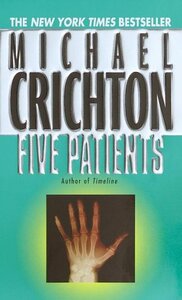Take a photo of a barcode or cover
Enjoyed the book and learning about the history of hospitals, along with the stories Crichton provided about the patients. The data given is severely outdated considering it was written 45 years ago but very interesting to see how different things were
informative
reflective
medium-paced
Questo libro parla di medicina d'urgenza, ma è del 1969 ed è questo a renderlo incredibilmente interessante. Leggendolo non ho potuto fare a meno di pensare che se mi catapultassero in quell'epoca non saprei fare il mio lavoro. Non saprei dispensare terapie senza eco, senza tac, senza un sacco di esami del sangue indispensabili. Eppure, la Boston del 1969 aveva un reparto di telemedicina per visitare i pazienti dell'aeroporto, tramite una telecamera in bianco e nero, un microfono, e un fonendo collegato a un medico a miglia di distanza. Se siete interessati alle trasformazioni storiche della medicina è il libro per voi.
This non-fiction book about medical care and hospitals was written by Michael Crichton in 1970, but in many ways could have been written today (ya know, if Crichton was still alive). Crichton explores medical costs and the need for insurance (Affordable Care Act precognition?), medical education, the history of medicine, and the changing roles of hospitals.
Probably the most surprising thing to me was how little had changed in medicine in the last 46 years since this book was written. All in all, an interesting read though I would be curious if I am right about how little has changed.
Probably the most surprising thing to me was how little had changed in medicine in the last 46 years since this book was written. All in all, an interesting read though I would be curious if I am right about how little has changed.
I read it because it was Crichon, but I really, only like fiction. This was too "real" for me.
DNFd on page 66
I thought this was going to be an exploration of 5 patients’ medical treatment and to some extent it is. However, the larger part of this book seems to be an examination of the history and present of the medical field at large, which I am just not interested in, especially given that this is now an outdated source for the subject.
I thought this was going to be an exploration of 5 patients’ medical treatment and to some extent it is. However, the larger part of this book seems to be an examination of the history and present of the medical field at large, which I am just not interested in, especially given that this is now an outdated source for the subject.
hopeful
informative
reflective
medium-paced
I assumed that it would be focused primarily on the stories of the five patients discussed, but it’s more focused on five discussions about the medical field using the five patients’ stories as a jumping board. It is still really interesting and provides a lot of insight into how the field has improved and what we still need to fix (as of the 1970s). Very interesting looking at what we knew we needed to fix then and realizing that we have yet to find a real solution to a lot of the issues.
informative
medium-paced
The main downfall is that it is now outdated. But can you blame it for that? The "current" research is that of the 1960s. I do, however, enjoy the detail and explanation of the rise of healthcare as a whole. Patient cases were briefly explained and served as the groundwork to explain the current medical trends and advancements.
I'd heard several people complain that this book was outdated. Yes... that is the entire point of reading it in 2021. If you'd like a take on current medicine, read a current book (or read the foreword). Part of the charm of reading Five Patients is looking back 50 years, especially for us young folk. Not all of Crichton's predictions are accurate (who could expect them to be?), but give a solid idea of the state of medicine and its practitioners at the time.
The dividing of the book into five sections for five patients, and more importantly five different topics in medicine (general hospital history, cost of healthcare, history of surgery, technology in the medical field, and medical education, respectively), works fairly well, but Crichton fails to consistently tie each patient's story to the topic to which he devotes each chapter. I wonder how well Five Patients would read split into two different books: one telling the stories of each patient, and another a collection of essays about the state of medicine in 1969.
The dividing of the book into five sections for five patients, and more importantly five different topics in medicine (general hospital history, cost of healthcare, history of surgery, technology in the medical field, and medical education, respectively), works fairly well, but Crichton fails to consistently tie each patient's story to the topic to which he devotes each chapter. I wonder how well Five Patients would read split into two different books: one telling the stories of each patient, and another a collection of essays about the state of medicine in 1969.

